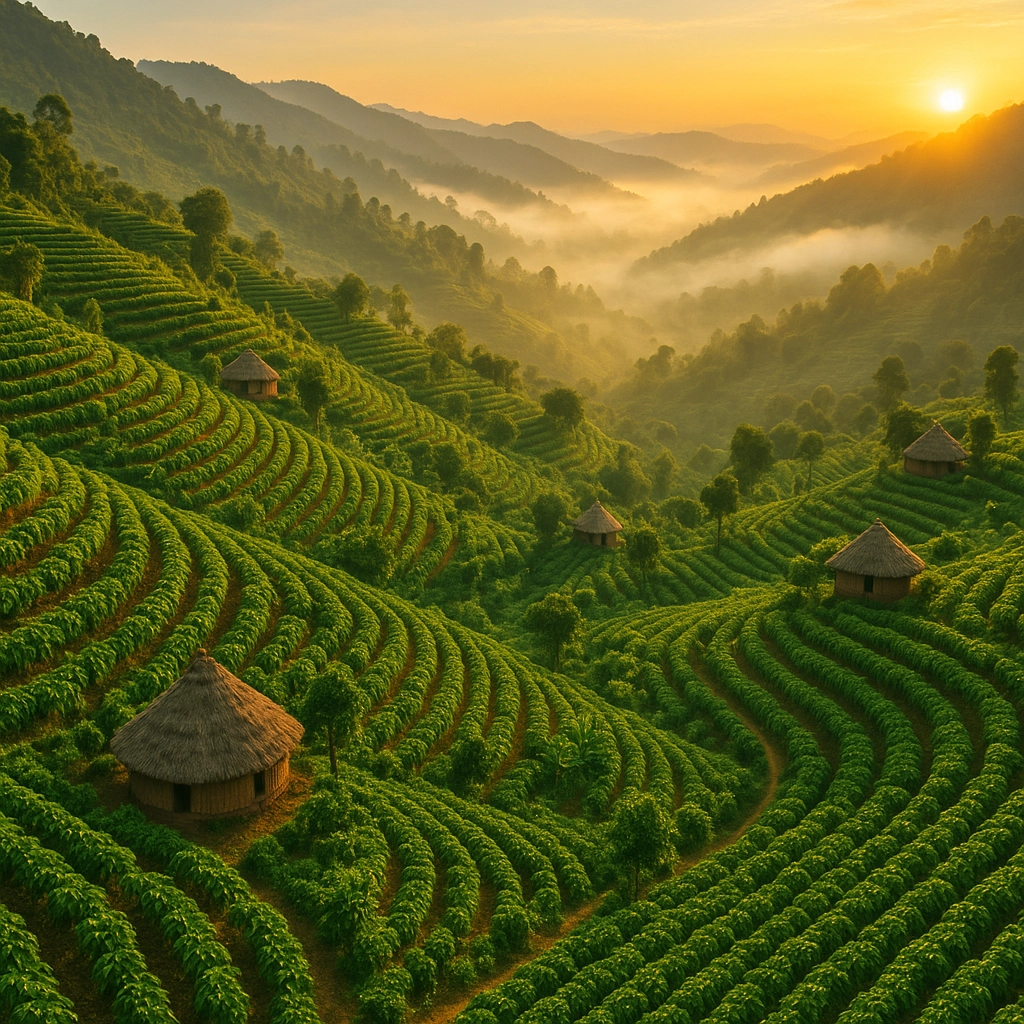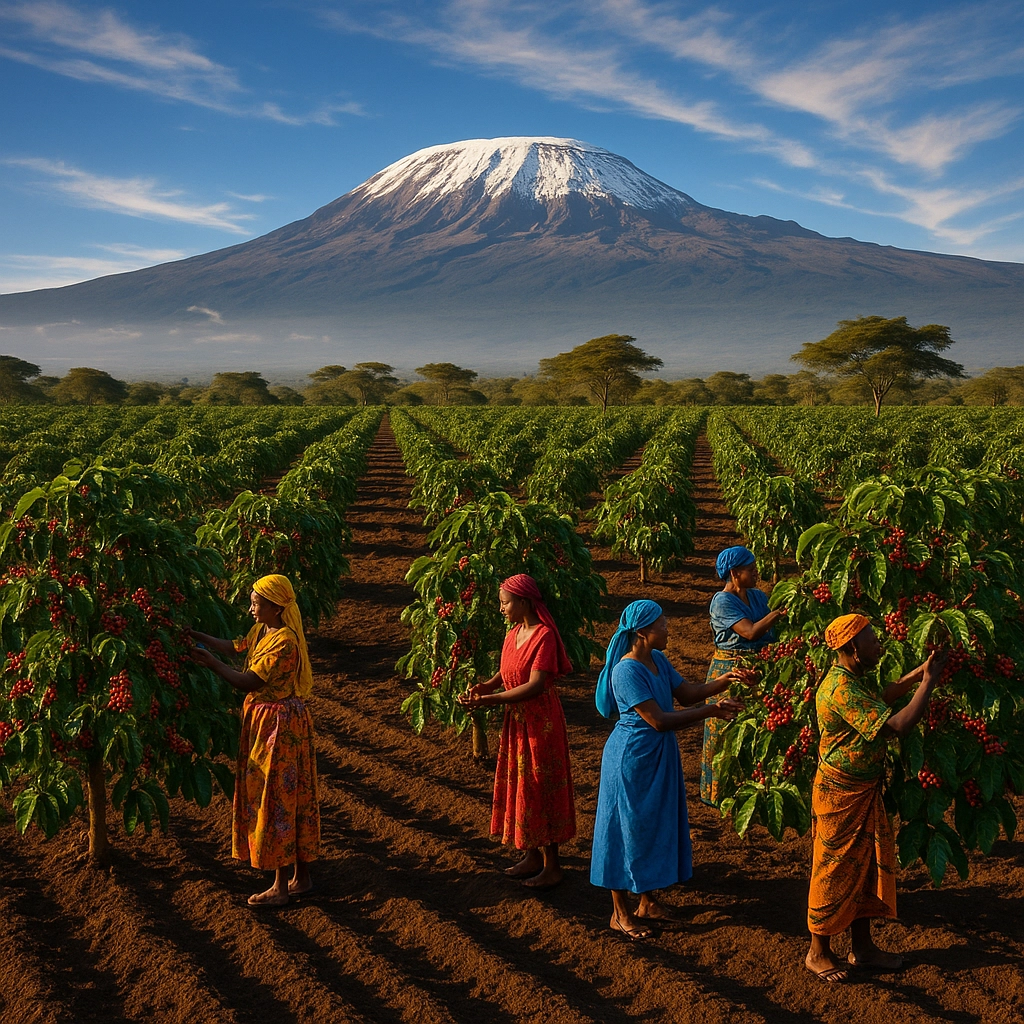Africa isn't just where coffee grows—it's where coffee began. The continent's highland regions produce some of the most complex, vibrant, and sought-after beans in the specialty coffee world. Today, we're diving into three powerhouse origins that consistently blow us away: Ethiopia, Tanzania, and Kenya. These countries represent the heart of what makes African coffee so special, each bringing unique flavors and stories to your cup.
At Carolina Coffee Works, we're constantly amazed by the diversity these origins offer. From Ethiopia's wild, fruity complexity to Kenya's bright acidity and Tanzania's rich, wine-like depth, these coffees showcase why African beans have such a devoted following among specialty roasters and coffee lovers alike.
Ethiopia: The Birthplace of Coffee
Let's start where it all began. Ethiopia holds the legendary title as coffee's birthplace, and honestly, it shows in every bean. The story goes that a goat herder named Kaldi discovered coffee when he noticed his goats getting unusually energetic after munching on certain berries. Whether that's true or not, Ethiopia's coffee game has been strong for over a thousand years.
What makes Ethiopian coffee so incredible is its genetic diversity. Ethiopian beans contain 99% more genetic material than coffee from anywhere else in the world. Most of this diversity remains unidentified, which is why you'll see many Ethiopian coffees labeled as "heirloom varieties." This genetic richness translates into some of the most complex flavor profiles you'll ever experience.

Key Ethiopian Regions
Yirgacheffe is probably the most famous Ethiopian region, and for good reason. These beans are like drinking liquid sunshine—bright, floral, and incredibly clean. You'll taste notes of bergamot, lemon zest, and white tea, with a delicate body that dances on your palate. The high altitude (around 2,000 meters above sea level) and careful processing create these signature characteristics.
Sidamo offers a different experience entirely. These beans tend to be more full-bodied with wine-like acidity and complex fruit notes. Think blueberry, dark chocolate, and sometimes even hints of cinnamon. The region's diverse microclimates mean you can get wildly different flavors from farms just a few miles apart.
Harrar brings the funk in the best way possible. These naturally processed beans are known for their heavy body and bold, sometimes wild flavors. We're talking blueberry, strawberry, and even bubblegum notes. Harrar coffees are often used in espresso blends because they can hold their own against milk while adding incredible complexity.
Brewing Ethiopian Coffee
Ethiopian beans shine in pour-over methods like V60 or Chemex, where their delicate flavors can really show off. Use a medium-light roast to preserve those bright, fruity characteristics. For Yirgacheffe, try a 1:16 ratio with water just off the boil (195-205°F). The key is letting those floral notes bloom without over-extracting.
Kenya: Bright, Bold, and Beautiful
Kenyan coffee is like that friend who always speaks their mind—bold, confident, and impossible to ignore. These beans are famous for their wine-like acidity and incredible brightness that can wake up your taste buds from across the room.
Kenya's coffee industry is relatively young compared to Ethiopia, but they've made up for lost time with serious attention to quality. Their grading system is meticulous, with AA being the gold standard for size and quality. But don't sleep on AB grades—they often deliver incredible value with similar flavor profiles.

What Makes Kenyan Coffee Special
The secret sauce is in the processing and varieties. Kenya primarily grows SL28 and SL34 varietals, which were developed specifically for the region's high-altitude conditions. These plants produce beans with incredible complexity and that signature Kenyan brightness.
Most Kenyan coffees go through a double fermentation process that enhances their acidity and clarity. The result? Coffees that taste like black currant, grapefruit, and wine, often with a syrupy body that coats your mouth in the best way possible.
Tasting Notes and Brewing
Expect flavors like black currant, grapefruit zest, dark chocolate, and sometimes tomato (in a good way, we promise). Kenyan coffees have a full body with bright acidity that creates incredible balance.
For brewing, try a medium roast in a French press or pour-over. The full body can handle a bit more extraction time, and the bright acidity cuts through beautifully. Use a 1:15 ratio and don't be afraid to experiment with slightly hotter water (205°F) to really pull out those complex flavors.
Tanzania: The Hidden Gem
Tanzania might be the underdog of this trio, but that just means more amazing coffee for those in the know. Tanzanian beans offer incredible complexity with a rich, wine-like character that falls somewhere between Ethiopian funkiness and Kenyan brightness.
The country's coffee grows on the slopes of Mount Kilimanjaro and in the southern highlands, where volcanic soil and high altitudes create perfect growing conditions. Many Tanzanian farms are small, family-owned operations that focus on quality over quantity—exactly the kind of sourcing we love at Carolina Coffee Works.

Flavor Profile and Character
Tanzanian coffees typically offer a medium to full body with bright acidity and complex fruit notes. You'll taste dark berries, wine, chocolate, and sometimes floral notes reminiscent of jasmine. The best Tanzanian beans have this incredible balance where the acidity enhances rather than overwhelms the other flavors.
What's really exciting about Tanzanian coffee is the variety. You might find beans that taste like dark chocolate and orange one day, then try another lot that's all about red wine and cherry. This diversity comes from the country's varied microclimates and processing methods.
Brewing Recommendations
Tanzanian coffee is versatile enough for multiple brew methods. Try it in a Chemex for a clean, bright cup that highlights the fruit notes, or go with a French press to emphasize the full body and chocolate characteristics. Medium roasts work best to preserve the origin characteristics while developing enough body to support the wine-like flavors.
Why Specialty Roasters Love These Origins
As coffee roasters, we're constantly looking for beans that tell a story and offer something unique. Ethiopian, Kenyan, and Tanzanian coffees check all those boxes and then some. Here's why they're staples in our single-origin collection:
Consistency with Variety: These origins reliably produce high-quality beans, but each harvest brings subtle differences that keep things interesting. It's like having a reliable friend who always surprises you with new stories.
Roasting Versatility: African beans respond beautifully to different roast profiles. Light roasts preserve the bright, fruity characteristics, while medium roasts develop body and sweetness without losing the origin character.
Customer Appeal: Coffee drinkers love the adventure these beans provide. They're approachable enough for newcomers to specialty coffee but complex enough to keep experienced coffee lovers engaged.
Traceability: Many farms in these regions are moving toward direct trade relationships, which means better prices for farmers and fresher, higher-quality beans for roasters like us.
The Carolina Coffee Works Difference
When we source beans from Ethiopia, Kenya, and Tanzania, we're not just buying coffee—we're investing in relationships. We work with importers who prioritize fair prices for farmers and sustainable practices that protect these incredible growing regions for future generations.
Our approach to roasting these African origins focuses on bringing out each bean's unique characteristics while maintaining the balance that makes them so special. Whether you're brewing a bright Ethiopian Yirgacheffe for your morning pour-over or pulling shots of Kenyan AA for an afternoon pick-me-up, we want every cup to showcase why African coffee is so beloved.
These three origins represent just the beginning of Africa's coffee story. Each country, region, and farm has something unique to offer, and we're constantly exploring new partnerships to bring you the most exciting beans we can find. Check out our current specialty coffee selection to see what African treasures we have available right now.
The next time you're sipping on Ethiopian, Kenyan, or Tanzanian coffee, take a moment to appreciate the incredible journey those beans made—from highland farms to your cup, carrying centuries of coffee tradition and the passion of farmers who truly understand their craft.

